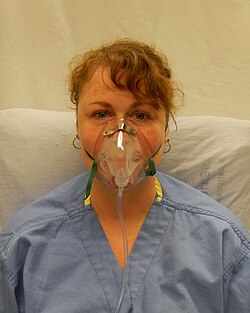Paroxysmal nocturnal dyspnoea
Editor-In-Chief: Prab R Tumpati, MD
Obesity, Sleep & Internal medicine
Founder, WikiMD Wellnesspedia &
W8MD medical weight loss NYC and sleep center NYC
| Paroxysmal nocturnal dyspnoea | |
|---|---|

| |
| Synonyms | PND |
| Pronounce | N/A |
| Specialty | N/A |
| Symptoms | Shortness of breath during sleep, cough, wheezing |
| Complications | Heart failure, pulmonary edema |
| Onset | Sudden, typically at night |
| Duration | Episodes last minutes to hours |
| Types | N/A |
| Causes | Congestive heart failure, obstructive sleep apnea |
| Risks | Hypertension, coronary artery disease, obesity |
| Diagnosis | Clinical evaluation, echocardiogram, polysomnography |
| Differential diagnosis | Asthma, chronic obstructive pulmonary disease |
| Prevention | Managing underlying conditions, weight loss, CPAP therapy |
| Treatment | Diuretics, oxygen therapy, lifestyle changes |
| Medication | ACE inhibitors, beta blockers |
| Prognosis | Varies depending on underlying cause |
| Frequency | Common in patients with heart failure |
| Deaths | N/A |
Paroxysmal Nocturnal Dyspnea (PND)
Introduction
Paroxysmal Nocturnal Dyspnea (PND), also known as paroxysmal nocturnal dyspnoea, is a medical condition characterized by sudden attacks of severe shortness of breath and coughing, typically occurring at night. It often awakens individuals from sleep and can be quite distressing.
Pathophysiology
PND is associated with various cardiac and respiratory conditions. It often occurs due to the redistribution of body fluid while lying down, leading to increased pulmonary venous return and pulmonary congestion.
Clinical Presentation
Patients with PND experience episodes of severe dyspnea (shortness of breath) that awaken them from sleep, usually 2-3 hours after falling asleep. Accompanying symptoms may include coughing, wheezing, and a feeling of suffocation.
Associations and Causes
PND is commonly associated with conditions like congestive heart failure, left ventricular failure, and certain forms of pulmonary edema. It can also be seen in patients with severe chronic obstructive pulmonary disease (COPD).
Diagnosis
Diagnosis of PND involves a thorough patient history, physical examination, and may include diagnostic tests such as chest X-rays, echocardiograms, or pulmonary function tests to determine the underlying cause.
Management and Treatment
The management of PND includes treating the underlying cause, such as administering diuretics for heart failure. Patients may find relief by sitting upright, especially at the side of the bed with legs dangling, as symptoms typically worsen when lying down.
Prevention and Lifestyle Modifications
Preventive measures include managing the underlying cardiac or respiratory conditions, adhering to treatment regimens, and lifestyle changes such as reducing salt intake and avoiding excessive fluid intake before bedtime.
See Also
References
1. [Link to a medical journal article on PND] 2. [Link to a health information site with details on PND]
External Links
Transform your life with W8MD's budget GLP-1 injections from $125.
W8MD offers a medical weight loss program to lose weight in Philadelphia. Our physician-supervised medical weight loss provides:
- Most insurances accepted or discounted self-pay rates. We will obtain insurance prior authorizations if needed.
- Generic GLP1 weight loss injections from $125 for the starting dose.
- Also offer prescription weight loss medications including Phentermine, Qsymia, Diethylpropion, Contrave etc.
NYC weight loss doctor appointments
Start your NYC weight loss journey today at our NYC medical weight loss and Philadelphia medical weight loss clinics.
- Call 718-946-5500 to lose weight in NYC or for medical weight loss in Philadelphia 215-676-2334.
- Tags:NYC medical weight loss, Philadelphia lose weight Zepbound NYC, Budget GLP1 weight loss injections, Wegovy Philadelphia, Wegovy NYC, Philadelphia medical weight loss, Brookly weight loss and Wegovy NYC
|
WikiMD's Wellness Encyclopedia |
| Let Food Be Thy Medicine Medicine Thy Food - Hippocrates |
Medical Disclaimer: WikiMD is not a substitute for professional medical advice. The information on WikiMD is provided as an information resource only, may be incorrect, outdated or misleading, and is not to be used or relied on for any diagnostic or treatment purposes. Please consult your health care provider before making any healthcare decisions or for guidance about a specific medical condition. WikiMD expressly disclaims responsibility, and shall have no liability, for any damages, loss, injury, or liability whatsoever suffered as a result of your reliance on the information contained in this site. By visiting this site you agree to the foregoing terms and conditions, which may from time to time be changed or supplemented by WikiMD. If you do not agree to the foregoing terms and conditions, you should not enter or use this site. See full disclaimer.
Credits:Most images are courtesy of Wikimedia commons, and templates, categories Wikipedia, licensed under CC BY SA or similar.
Contributors: Kondreddy Naveen, Prab R. Tumpati, MD


